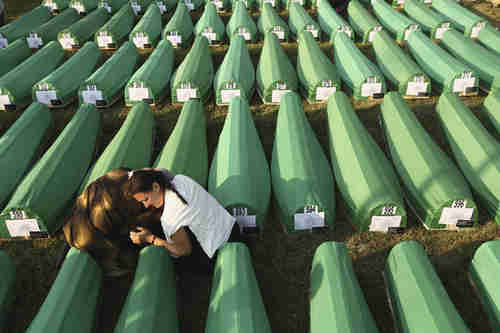Hundreds of people lined Sarajevo’s main street on Saturday, as trucks bearing 613 coffins carrying victims’ remains pass through to Srebrenica, where the victims of Europe’s worst massacre since World War I will be buried, according to AP. The 613 sets of remains, found in mass graves and identified through DNA tests, will be buried at a memorial center near Srebrenica on Monday — the 16th anniversary of the massacre in which more than 8,000 Bosnian men and boys were killed.
 Two young women on Saturday mourn over one of 613 coffins of Srebrenica massacre (Getty)
Two young women on Saturday mourn over one of 613 coffins of Srebrenica massacre (Getty)
At least 8,3000 Bosniak (Bosnian Muslim) men and boys who had sought safe haven at the U.N.-protected enclave at Srebrenica were killed by Orthodox Christian Serbs under the leadership of General Ratko Mladic. ( “27-May-11 News — Europe cheers the capture of Ratko Mladic, the butcher of Srebrenica”)
Thousands of people will gather in Srebrenica on Monday to mark the 16th anniversary of the massacre.
When the three-year war ended in 1995, it was hoped that time would heal the wounds, but that has not happened. To the contrary, Bosnia is now mired in its worst crisis since the end of the war, according to an analysis by the Irish Times.
Although everyone seems to agree that the Bosniaks suffered the most from the war, Serb activists are claiming that they are getting no recognition or support over the atrocities that were perpetrated on them. More than 500 Serb civilians are thought to have been held in the Tarcin silo and about 24 were killed, some from beatings and disease but more from gun and shell fire while doing forced labor for their Bosniak captors. The silo was one of scores of camps in which Bosniaks and Croats held Serbs, but only a handful of people have been charged with crimes committed in them. “What happened in these concentration camps is not recognized and we get no help from Bosnia or the international community,” says one Serb activist.
Meanwhile the small Croat community is becoming increasingly radical in demanding more power to protect its interests. Croatian nationalists are demanding that Croats have their own governmental entity, so that they can run their own affairs without being dominated by the Bosniaks.
According to the analysis, violence is not imminent in Bosnia. While nearly everyone agrees that good personal relations among Muslims, Serbs and Croats are not only possible but common, most people also believe that their interests will be protected only by leaders of their own ethnicity.
From the point of view of Generational Dynamics, what we’re seeing is a transition from a post-war Recovery era into a new Awakening era. The Recovery era immediately follows the end of the war, and the survivors set up austere rules and institutions to guarantee that no such war will ever happen again. The Awakening era begins 15-20 years later, when the kids growing up after the war begin to make their voices heard, and they reject the rules and the compromises imposed by their parents at the end of the war.
What we’re seeing now is young activists making demands that their parents are too risk-averse to pursue. Bosniaks are continuing to commemorate the massacre, while Serb and Croat activists are beginning to make demands.
The expected pattern is what happens starting 15-20 after most crisis civil wars: political differences become more confrontational, and start to become violent; there are alternating periods of violence and peace, with each new period of violence worse than the last; until finally, decades later, there’s a new civil war.
Dutch court rules that Netherlands is responsible for Srebrenica deaths
In a completely unexpected decision, a Dutch appeals court ruled last week that the deaths of three Muslim men in the Srebrenica massacre were the responsibility of the Netherlands. At the time of the massacre, Dutch U.N. troops were in a peacekeeping operation, in charge of what was designated a U.N. safe haven during the Bosnian war. However, when the Serbs demanded that the Muslim prisoners be turned over, the Dutch peacekeepers complied, and the Muslims were massacred. This may be the first time that a state has been held accountable for a peacekeeping operation that went wrong. VOA
Iranian Resistance accuses U.S. of responsibility for Ashraf massacre
In July 2009, and again in April 2011, Iraqi forces attacked and massacred Iranian Resistance forces living in Ashraf, a city about 40 miles north of Baghdad. Following the above ruling by the Dutch appeals court, Iranian Resistance activists are accusing the U.S. of being more responsible for the massacre at Ashraf than the Dutch were for the massacre at Srebrenica. NCR-IRAN
COMMENTS
Please let us know if you're having issues with commenting.